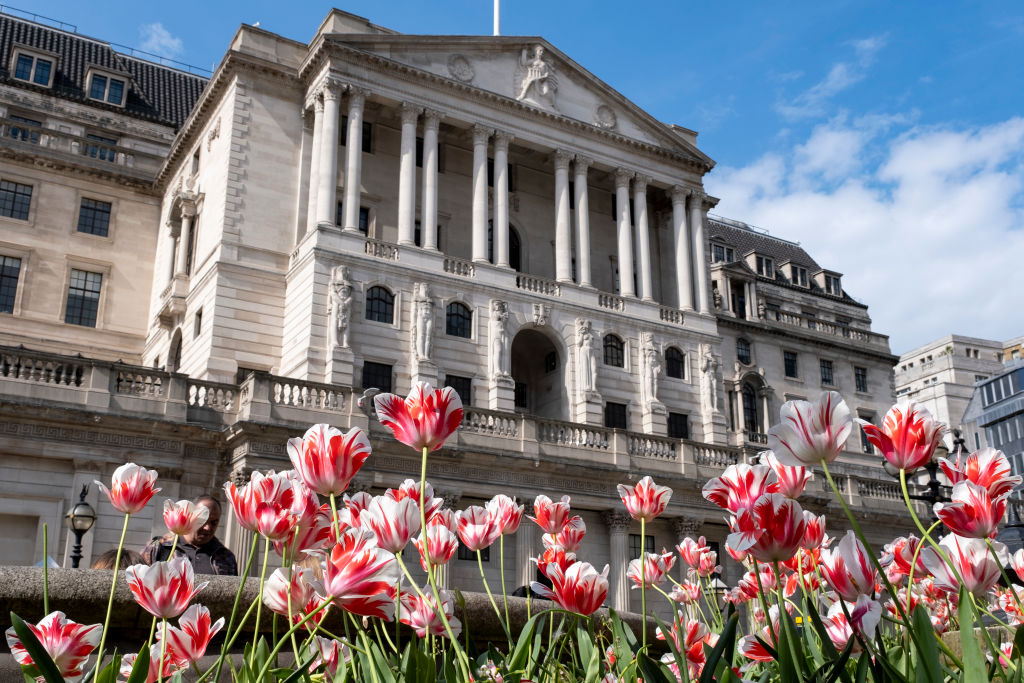UK inflation forecast: where are prices heading next?
UK inflation fell sharply in January. Is price growth expected to fall further in 2026, and when will inflation go back to the 2% target?


Get the latest financial news, insights and expert analysis from our award-winning MoneyWeek team, to help you understand what really matters when it comes to your finances.
You are now subscribed
Your newsletter sign-up was successful
Want to add more newsletters?
Inflation fell to 3% in the year to January 2026, mostly in line with analyst expectations, as price growth in the UK appears to continue its downward trend.
It followed an uptick in the year to December 2025, when CPI inflation rose to 3.4%, according to the Office for National Statistics (ONS).
The sharp January dip was mostly caused by disinflationary pressures in transport, food and non-alcoholic beverages, and housing and household services.
MoneyWeek
Subscribe to MoneyWeek today and get your first six magazine issues absolutely FREE

Sign up to Money Morning
Don't miss the latest investment and personal finances news, market analysis, plus money-saving tips with our free twice-daily newsletter
Don't miss the latest investment and personal finances news, market analysis, plus money-saving tips with our free twice-daily newsletter
Transport was the largest contributor of these, bringing inflation down by just under 0.2 percentage points alone. Within this sector, airfares were under a particularly significant downward pressure – prices fell from December’s high when a festive rush pushed up the price of air travel.
Consumers in the UK will breathe a sigh of relief after January’s data showed inflation is on the way down after a worrying rise in December – but will inflation keep falling in 2026?
We look at where inflation may be going next, and what it could mean for interest rates.
When will inflation come down?
At the start of 2025, inflation fell close to the 2% target but quickly rose to a high of 3.8% by July. Inflation stayed at this level between July and September, then fell in October and November.
But this trend of either plateauing or falling inflation was bucked in the final month of 2025, when December’s data showed price growth rose to 3.4%.
Thankfully, January’s data supports the case being made by many analysts that the December figures were not the start of another period of rising inflation, but were instead a blip as spending increased over the festive season.
Almost all economists now agree that inflation will continue trending downwards throughout 2026. That is not to say that inflation won’t rise at all in some months, but overall, analysts believe inflation will be significantly lower at the end of the year than in January.
Every economist surveyed by the Treasury between 2 and 12 February echoed this view, with the average inflation prediction for Q4 2026 being 2.2%.
Following the release of January’s inflation data, Sanjay Raja, chief UK economist at Deutsche Bank, said “the disinflation path remains largely intact”.
“Despite stronger services price momentum to start the year, we see CPI taking another big step down in spring, as some of the big administrative prices wash out of the annual rate calculation. We expect CPI to track nearer 2% by spring,” he said.
He added that slower wage growth will “help temper price rises” and that the government’s energy bill cut in April will also help decrease inflation.
Deutsche Bank estimates that inflation will slow from an average of 3% in the first quarter of 2026 to an average of just over 2% in the second quarter.
The Office for Budget Responsibility (OBR), the UK’s fiscal watchdog, also agrees with the consensus, though it predicts inflation in Q4 2026 will reach 2.1%, 0.1 percentage point below the average forecast.
Meanwhile, the Bank of England also expects inflation will fall throughout 2026. In its February Monetary Policy Report it said it now expects price growth to reach 2.1% in the second quarter of 2026.
The Bank noted that the measures announced in the Autumn Budget have meant it now expects inflation to fall much faster in 2026 than it did when it published its November 2025 report.
What’s the link between inflation and interest rates?
Inflation above the 2% target is always a cause for concern for economists, policymakers and consumers.
The Bank of England is particularly focused on inflation, as it has a remit to guide and control inflation so prices do not spiral out of control.
This is largely done through influencing interest rates, which are typically raised to fight inflation.
Broadly speaking, the trade-off to fighting inflation with higher interest rates is reduced economic activity. When interest rates are high, people have to use more of their earnings on expenses like their mortgage and are incentivised to save their cash as savings rates tend to be higher.
However, despite inflation having been above target for all of 2025, the Bank of England has still gradually cut rates since the summer of 2024.
What does falling inflation mean for future interest rate cuts?
The Bank of England chose to hold interest rates at 3.75% at the most recent Monetary Policy Committee (MPC) meeting on 5 February.
The vote to hold was surprisingly close, passing by just one vote, as four of the nine members of the MPC wished to cut rates again. Most analysts expected the vote to be more united.
One reason that more MPC members are more inclined to cut rates is that inflation now seems to be on a firmly downwards trend, with the Bank expecting a much faster return to target thanks to measures announced in the Budget.
But will this lead to further rate cuts in the future? The answer seems to be yes.
Chris Beauchamp, chief market analyst at IG, explained: “A month-on-month drop in both headline and core inflation certainly delivers the goods for the UK economy, clearing the way for a fresh rate cutting campaign by the BoE.
“It looks like Britain, and her embattled government, have managed to come through the summer's hotter run of inflation, and provides some hope that we can see a sustained improvement in employment and growth figures by year end.”
Get the latest financial news, insights and expert analysis from our award-winning MoneyWeek team, to help you understand what really matters when it comes to your finances.

Daniel is a financial journalist at MoneyWeek, writing about personal finance, economics, property, politics, and investing.
He covers savings, political news and enjoys translating economic data into simple English, and explaining what it means for your wallet.
Daniel joined MoneyWeek in January 2025. He previously worked at The Economist in their Audience team and read history at Emmanuel College, Cambridge, specialising in the history of political thought.
In his free time, he likes reading, walking around Hampstead Heath, and cooking overambitious meals.
-
 What the government’s baby boomer retirement data says about the future of pensions
What the government’s baby boomer retirement data says about the future of pensionsA study of the retirement routes of people born in 1958 paints a worrying picture for people’s pension savings
-
 An experienced investor’s end of tax year checklist
An experienced investor’s end of tax year checklistThe clock is ticking down before the end of the 2025/26 tax year, when any tax-free savings and investment allowances are lost. For experienced investors, though, the deadline for some tax-saving schemes is even earlier.
-
 Why Scotland's proposed government bonds are a terrible investment
Why Scotland's proposed government bonds are a terrible investmentOpinion Politicians in Scotland pushing for “kilts” think it will strengthen the case for independence and boost financial credibility. It's more likely to backfire
-
 How have central banks evolved in the last century – and are they still fit for purpose?
How have central banks evolved in the last century – and are they still fit for purpose?The rise to power and dominance of the central banks has been a key theme in MoneyWeek in its 25 years. Has their rule been benign?
-
 UK to have highest inflation among advanced economies this year and next, says IMF
UK to have highest inflation among advanced economies this year and next, says IMFThe International Monetary Fund (IMF) says it expects inflation to remain high in the UK, while lowering economic growth forecasts for 2026.
-
 Is Britain heading for a big debt crisis?
Is Britain heading for a big debt crisis?Opinion Things are not yet as bad as some reports have claimed. But they sure aren’t rosy either, says Julian Jessop
-
 'Britain is on the road to nowhere under Labour'
'Britain is on the road to nowhere under Labour'Opinion Britain's economy will shake off its torpor and grow robustly, but not under Keir Starmer's leadership, says Max King
-
 'Governments are launching an assault on the independence of central banks'
'Governments are launching an assault on the independence of central banks'Opinion Say goodbye to the era of central bank orthodoxy and hello to the new era of central bank dependency, says Jeremy McKeown
-
 Why investors can no longer trust traditional statistical indicators
Why investors can no longer trust traditional statistical indicatorsOpinion The statistical indicators and data investors have relied on for decades are no longer fit for purpose. It's time to move on, says Helen Thomas
-
 Live: Bank of England holds UK interest rates at 4.5%
Live: Bank of England holds UK interest rates at 4.5%The Bank of England voted to hold UK interest rates at their current level of 4.5% in March, as widely anticipated, after inflation rose to 3% in January